Are you sitting comfortably? Good, then relax and let me tell you the tale of rugby’s white knights…
Before billionaire businessman Steve Lansdown was unveiled as Bristol’s new owner in 2012, he was cryptically referred to in official club documents only as “White Knight”. Once Lansdown was revealed as the rugby club’s new owner, it emerged that he had been bankrolling the club for the previous three seasons, and that it was thanks to his financial intervention that the club had avoided administration in the 2008-09 campaign.
How English rugby could do with a whole cavalry of Arthurian knights on the horizon right now; romantic, gilded figures riding to the rescue of a league where financial stability has been sacrificed at the altar of giddily unsustainable player wages, which in turn have been premised on the game attracting ever-higher commercial revenues – revenues which still seem to belong to a land far, far away.
Forget white knights. English rugby has felt far closer to the Four Horsemen of the Apocalypse in recent times.
Bristol, to an extent, have been inoculated against the financial contagion raging through the wider league by the medicinal quality of Lansdown’s incredibly deep pockets. And as the game’s budgetary issues show no sign of easing, the time is right to consider just what the case of Bristol can tell us about what is going on in the Premiership – particularly because the club’s near-collapse 15 years ago has been little-mentioned amid the recent sound and fury.
The general frailties of the English game’s finances are now well-documented, even if solutions remain a holy grail. The game’s dirty laundry has been aired in Parliament, and Parliament has declared the organisation of the English game to be a mess. Worcester and Wasps’ collapse was labelled a “stain on the reputation” of the RFU by the Digital, Culture, Media and Sport Committee, who lamented the quality of oversight by the game’s governing bodies. For many of the Premiership clubs that remain, cash-flow remains tight, debts remain high, and creative solutions have been needed to stay afloat. Earlier this season, Exeter chairman Tony Rowe agreed to buy a stake in the hotel owned by the club to enable the Chiefs to pay back Covid-19 loans, while London Irish owner Mick Crossan offered to give the club away for free to anyone willing to fund it.
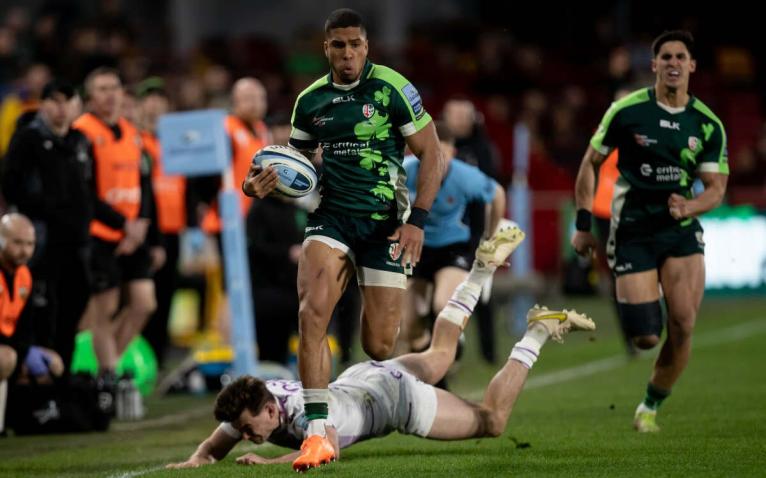
In other words, Rowe was forced to act as white knight to his own club, while Crossan has been scanning the horizon for a white knight for many months; a search for reinforcements which looks likely to end in the form of an American investment fund.
Rather than rugby’s equivalent of Arthurian knights riding to the rescue, it looks like dollars may well do the business instead.
All the while, clubs remain divided about whether the salary cap should rise again having been chopped in the wake of the financial mayhem wrought by the pandemic. And to cap it all, a player drain to other leagues appears to be afoot.
What can Bristol Bears tell us about this situation? Quite a lot, it turns out. But first we need to head down to the changing rooms at Ashton Gate in the wake of the Bears’ defeat to Clermont Auvergne.
This was a night when Bristol’s big-name players failed to step up and pack a punch, and when the Bears’ occasionally soft underbelly was exposed. Three of the tries they conceded were self-inflicted wounds.
Aurélien Rougerie, a lifelong servant of Clermont rugby, is standing outside the changing rooms underneath Ashton Gate cradling a crate of Heineken lager like it is a new-born child. His unfeasibly handsome features are locked in a broad smile, as well they might be after his Clermont side have just beaten the Bears on their own turf in the Challenge Cup round of 16. The smile becomes even more pronounced when he is told that the pizzas are on their way. Around him, bare-chested, exuberant French players are dominating the concourse, cheerfully delivering the odd post-match interview.
Behind Rougerie, through the doors into the Clermont changing room, things are getting lively. It’s not quite the Moulin Rouge, but voices and bottles are raised, and a good time is clearly under way. They are, it is fair to say, enjoying the away win. Inevitably, the singing breaks out.
The Bristol players are nowhere to be seen. But in whichever corner of Ashton Gate they’re hiding it must be galling for them to hear the auditory reminder that they remain some distance from European rugby’s top table.
This was a night when Bristol’s big-name players failed to step up and pack a punch, and when the Bears’ occasionally soft underbelly was exposed. Three of the tries they conceded were self-inflicted wounds.
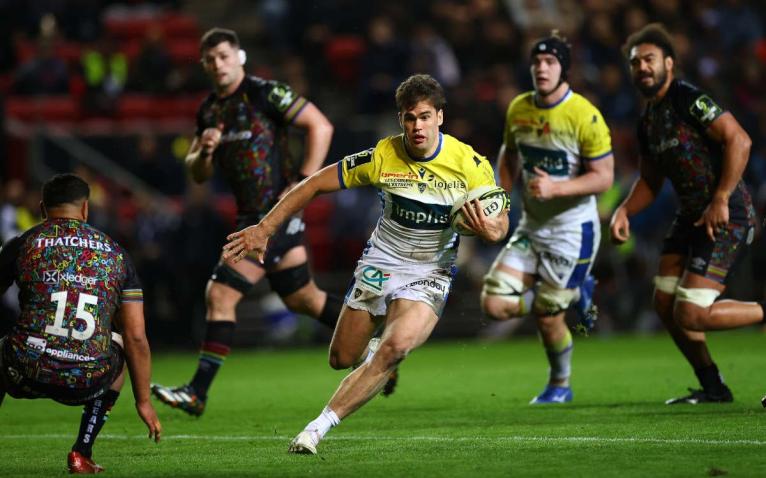
How hot and cold do Bristol blow. After the demolition jobs meted out here in good conditions to Northampton and Harlequins, the Bears have become unstuck against a chunky pack in poor conditions.
Rougerie has entered the fray of the noisy changing room with his new born, and Pat Lam, the Bristol director of rugby, speaks to me with a quiet patience when I ask him about the club’s European ambitions. “It’s fine margins,” he says. “It’s disappointing but that’s sport. Talking to the Clermont boys, it’s been a difficult season for them as well. It’s all fine margins. But that’s what it is, that’s why we love sport. It’s about we do about it: regroup, come back and go again.
“It’s a big finish in the Premiership now. One place we have to end up is the Champions Cup next year. We’ve got to be in the top eight. There’s some big rugby to come.”
Not that the Premiership is purely a means to an end, but Europe is where Bristol fix much of their focus. They won their first ever European title in 2020 when they beat Toulon in the final of the Challenge Cup, but triumph in the Champions Cup is a stated goal for Lam. It is inconceivable that it is not on the list of targets that Lansdown will have drawn up for the DoR when Lam signed a seven-year contract in 2021, a contract that has been questioned from without in recent months. There is a professional and personal urgency to Lam’s insistence that the Bears need to qualify for the Champions Cup come the end of the regular season.
The whole rebrand of Bristol into the Bristol Bears in 2018 was based around the principle of the club pushing on to become the champions of Europe.
Indeed, the whole rebrand of Bristol into the Bristol Bears in 2018 was based around the principle of the club pushing on to become the champions of Europe. And that is why their current position means they are a very considerable distance from where they would hope, aim and expect to be.
Yet the West Country side’s brand-building is significant and something that other clubs could take a lead from. Inevitably, there were eyebrows raised when Lansdown announced that the club would be adding the “Bears” tag, but few would depart from the view that the re-brand has bedded in well, creating an image that to some extent transcends the sport in the city. If the higher echelons of rugby union are to remain meaningfully and sustainably professional, then commercial viability has to be front and centre. The Bears rebrand was done with global markets in mind – including the USA and Asia – and while the Premiership’s foray into those markets remains limited, the Bears have been positioning themselves for the upswing. This is where Lansdown’s commercial acumen and global perspective is a boon, not least when considering that the Bears sit within his wider Bristol Sport group. When you have set up a massively successful investment company with a global reach, an appreciation of global markets is second nature – even if the wider Premiership product isn’t, currently, at the point of penetrating many of those markets.
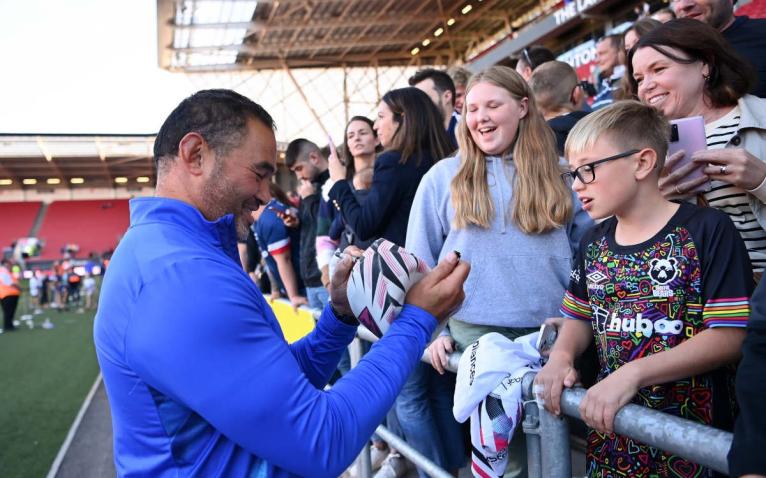
Alongside the rebrand, there have been other supplementary marketing masterstrokes at Bristol that have assisted the club’s commercial power and positioning. The club’s social media has long been considered one of the most innovative in the Premiership. November’s match against South Africa at a packed-out Ashton Gate was an inspired move, delivering the club’s largest crowd and pulling in a wider supporter base. And it did no harm that the Bears won, too.
All of which reflects Lansdown’s long-established commercial credentials. But Lansdown’s involvement is not just on the business side. As has been seen recently, the White Knight has passion too.
There are moments in sport when emotion as much as skill and fitness get you over the line; where will and bloody-mindedness do the job that training and conditioning usually accomplish. When the Bears hung on to beat their closest rivals Bath at The Recreation Ground on February 24, it was arguably one such moment.
Staring down the barrel of an end to both their Premiership season and their chances of Champions Cup qualification, Lam delivered some blunt and emotional words at half time. When the Bears snuck home,Lansdown made a beeline to the post-match huddle as the Bears belted out a song. “Steve was very emotional,” said Lam after the game. “He said that at 13-12 down it was our season on the line. He was proud of the guts the boys showed.”
Like Tony Rowe at Exeter, Lansdown is not a sleeping chairman with just a moderate interest in the sport. He is showing an increasing involvement.
This emotional investment from their owner is another thing in Bristol’s favour. Like Tony Rowe at Exeter, Lansdown is not a sleeping chairman with just a moderate interest in the sport. He is showing an increasing involvement. And while no coaching team wants the owner trying to literally or metaphorically pick the team, it is also reassuring to know the boss cares.
But let’s not dance around the big issue. It is also reassuring to know the club is seriously minted; that there is a one-person insurance policy against the financial shocks that other less fortunate clubs might not be able to withstand. Quite rationally, the financial stability – or jeopardy – of a club now looms large in players’ and agents’ minds. There is no point signing a four-year deal with a club on lucrative terms if the club is teetering on the brink. The game needs stability and, in the short-term at least, stability can come in the form of deep pockets.
As such, what might be termed the Midas Model of rugby club economics – or the ‘sugar daddy’ business model – can be said to have its place. For better or worse, it arguably not only has its place in the English game right now but is a necessity, at least until a semblance of financial order is restored across the Premiership.
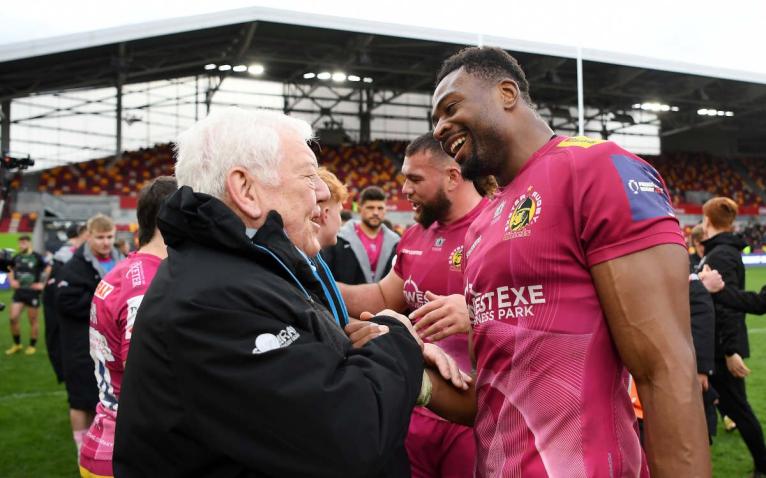
In an interview with Steve Cotton, the Bristol Post’s exceptional rugby correspondent at the time of his 2012 purchase, Lansdown pledged not to overspend in a bid to find instant success with the rugby club. Of course, Lansdown has gone on to spend huge amounts of money on the club. It is much the same as what has happened with Bruce Craig at Bath Rugby, another incredibly wealthy owner. After buying Bath outright from the previously hands-off chairman Andrew Brownsword in 2010, Craig outlined plans to invest in the club for a limited number of years before it then became self-financing.
Yet the idea of a top-flight English rugby club washing its own face seems less plausible now than it did a decade ago. The result is the likes of Lansdown and Craig making interest-free loans to their respective clubs, loans which are in all likelihood never going to be repaid. While temporarily pragmatic to guarantee the future of the clubs, this is no way to run any organisation sustainably in the long-term. It also acts as a distorting factor, hiding from plain view the deeper financial malaise within clubs and the Premiership generally.
As both Bath and Bristol have shown, it is possible to both be bankrolled off the pitch and steamrollered on it.
So, the Midas Model can never be more than a temporary measure. The tales of Craig and Lansdown’s investments – pre-dating as they do by some time rugby’s official financial crisis – highlight the long-standing precarity of English clubs being unable to cover their outgoings by genuine revenue, and instead relying on owner bailouts. As has been said so often, the warning signs have been there for many years in the English game.
And what of on-field performance? While the Midas Model provides stability for clubs in times of financial tumult, it is far from being a guarantee of success on the field. As both Bath and Bristol have shown, it is possible to both be bankrolled off the pitch and steamrollered on it. Bath finished bottom of the pile last season and look to be giving back-to-back wooden spoons a really good go. That money does not buy success on the rugby pitch is a fact that is as distressing to those who have sunk millions into clubs as it is reassuring to those with more modest means. And it holds a romantic appeal to the minority who think that professionalism was just one gigantic mistake.
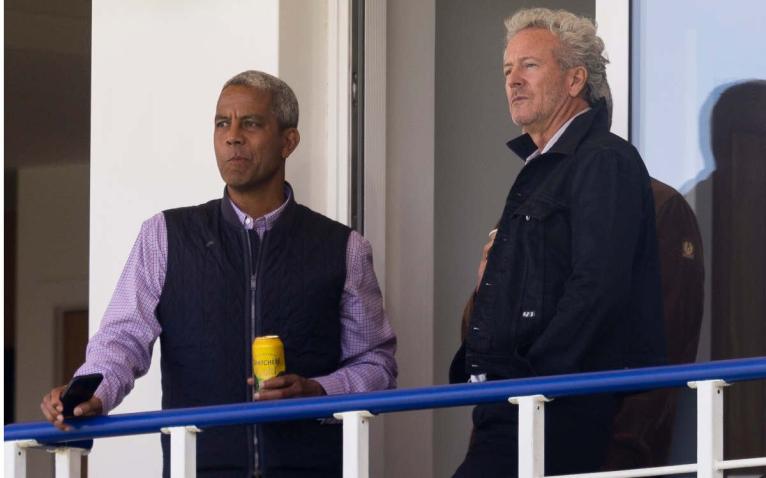
The stability provided by Lansdown’s investment in the Bears in part explains how the club was able to announce the contract extensions of nine key first-team players in late March, including club captain Steven Luatua, who is equally as influential as Bristol’s own, Ellis Genge, the brilliantly dynamic Harry Thacker and the gifted centre Piers O’Conor. Announcing the extensions, Lam appeared to go slightly mystical, declaring that the senior players would “continue to mentor the next group of players coming through around the Bears Way”. Whether this turns out to be the way, the truth and the light at Ashton Gate is as yet undetermined, but Lansdown’s financial wherewithal at least provides a guarantee that the Bears have a future while so many clubs around them dance on a precipice of uncertainty.
When Lansdown bought Bristol he made a modest, inoffensive statement. “I like to think this is a positive announcement for the rugby club and that the rugby world will sit up and take notice a little bit that Bristol are heading in the right direction.” One pandemic and one almighty rugby financial crisis later, Bristol supporters – and the Premiership itself – are grateful for the White Knight’s immense wealth and its protective powers. But the story of the Bears is proof that money is only one part of the Premiership’s perplexing equation.


Comments
Join free and tell us what you really think!
Sign up for free